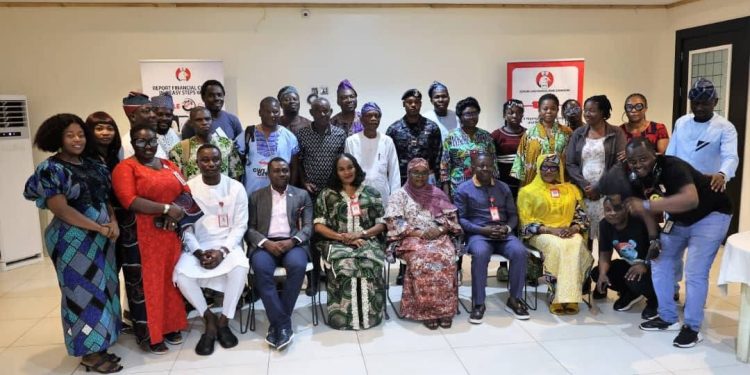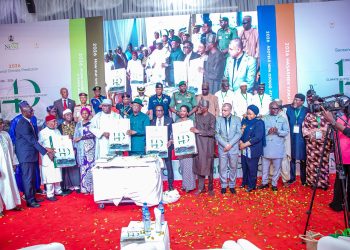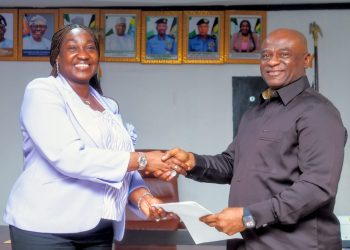By Nkechi Eze
The Executive Chairman of the Economic and Financial Crimes Commission (EFCC), Mr. Ola Olukoyede, has commended the Nigerian media and Civil Society Organisations (CSOs) for their unwavering commitment and sustained contributions to the fight against economic and financial crimes in the country, particularly internet fraud in the Southwest region.
According to an official statement signed by the EFCC’s spokesperson, Dele Oyewale, the commendation was made on Friday, 17 October 2025, during a one-day interactive workshop organised by the Commission for journalists and CSOs at the EFCC Ibadan Zonal Directorate. Represented by the Acting Zonal Director, ACE I Hauwa Garba Ringim, Mr. Olukoyede described the media and CSOs as “indispensable allies” in the Commission’s anti-corruption crusade, stressing that their roles in advocacy, public enlightenment, and investigative reporting have significantly deepened citizens’ understanding of the EFCC’s activities.
He noted that the workshop was designed to foster mutual engagement, exchange of ideas, and encourage constructive feedback that would further enhance the Commission’s accountability and performance. “Through the continuous advocacy campaign, reportage, and public enlightenment efforts of the CSOs and the media, Nigerians are now better informed about the Commission’s anti-corruption activities,” he said. “This interactive session is designed not only to share ideas and perspectives but to encourage constructive feedbacks and objective analyses that can further enhance the EFCC’s performance and accountability.”
Olukoyede reaffirmed that the EFCC would continue to uphold transparency and collaboration in its operations. “The partnership among the CSOs, media, and the EFCC has yielded meaningful results over the years, and we remain committed to sustaining and expanding this collaboration through continuous engagement and strengthening institutional mechanisms to curb economic and financial crimes,” he added. He further assured participants that the EFCC will continue to provide accurate and timely information to facilitate informed public engagement and oversight, noting that improved access to credible information will promote good governance and move Nigeria closer to a corruption-free society.
Delivering a paper titled “Prosecuting Financial Crimes: Issues, Challenges, and the Way Forward,” the Head of Legal and Prosecution Department at the Ibadan Directorate, DCE Gift Iwebafa Odibo, expressed concern over the “persistent security threats and risks faced by EFCC prosecutors during out-of-jurisdiction prosecutions, especially when handling high-profile or politically exposed persons.” She called for stiffer penalties for internet fraudsters to serve as stronger deterrence than community service sentences.
Speaking in the same vein, the Head of Media and Publicity of the EFCC, DCE Dele Oyewale, urged the media and CSOs to intensify their collaborative efforts in spreading the anti-corruption message to the grassroots. “The pivotal roles played by Civil Society Organisations and the media so far towards the remarkable achievements of the Commission cannot be overemphasised,” he said. “However, there must be a deliberate and holistic approach in amplifying the fight against economic and financial crimes across the country.”
Oyewale cited the EFCC’s achievements under Mr. Olukoyede’s leadership, noting that in 2024 alone, the Commission arraigned five former governors and five former ministers in its renewed drive to enforce accountability. “This demonstrates the political will of President Bola Tinubu’s administration to prosecute corruption cases and curb economic sabotage,” he said. He assured participants that the EFCC would continue to operate an open-door policy, prioritising transparency, collaboration, and constructive criticism in its engagement with stakeholders.
In another presentation titled “Understanding Cryptocurrency Fraud and Other Emerging Financial Crimes,” the Head of Digital Forensics, CSE Alex Ogbole, warned against the growing prevalence of cryptocurrency-related investment scams, urging Nigerians to be cautious of get-rich-quick schemes that could lead to financial losses. He appealed to the media and CSOs to help the EFCC in sensitising the public to avoid falling victim to fraudulent investment offers.
Similarly, the Head of Enlightenment and Reorientation Unit of the Commission, ACE II Aisha Mohammed, raised concern over the increasing involvement of minors in internet fraud, revealing that several underage individuals had been arrested during sting operations. “This is worrisome,” she said. “If this continues, every household may soon have a ‘Yahoo’ ex-convict. Parents must pay close attention to their children and the company they keep to prevent negative influence.”
Mohammed appreciated the participants for their strong turnout and urged them to further spread the EFCC’s anti-corruption message to all corners of society. The workshop provided participants with a platform to exchange constructive ideas, share experiences, and propose solutions on how the EFCC can strengthen collaboration with the media and civil society.
The event underscored the EFCC’s sustained commitment to fostering synergy with strategic partners in promoting public enlightenment, transparency, and the shared responsibility of safeguarding Nigeria’s resources for the benefit of all citizens.

















